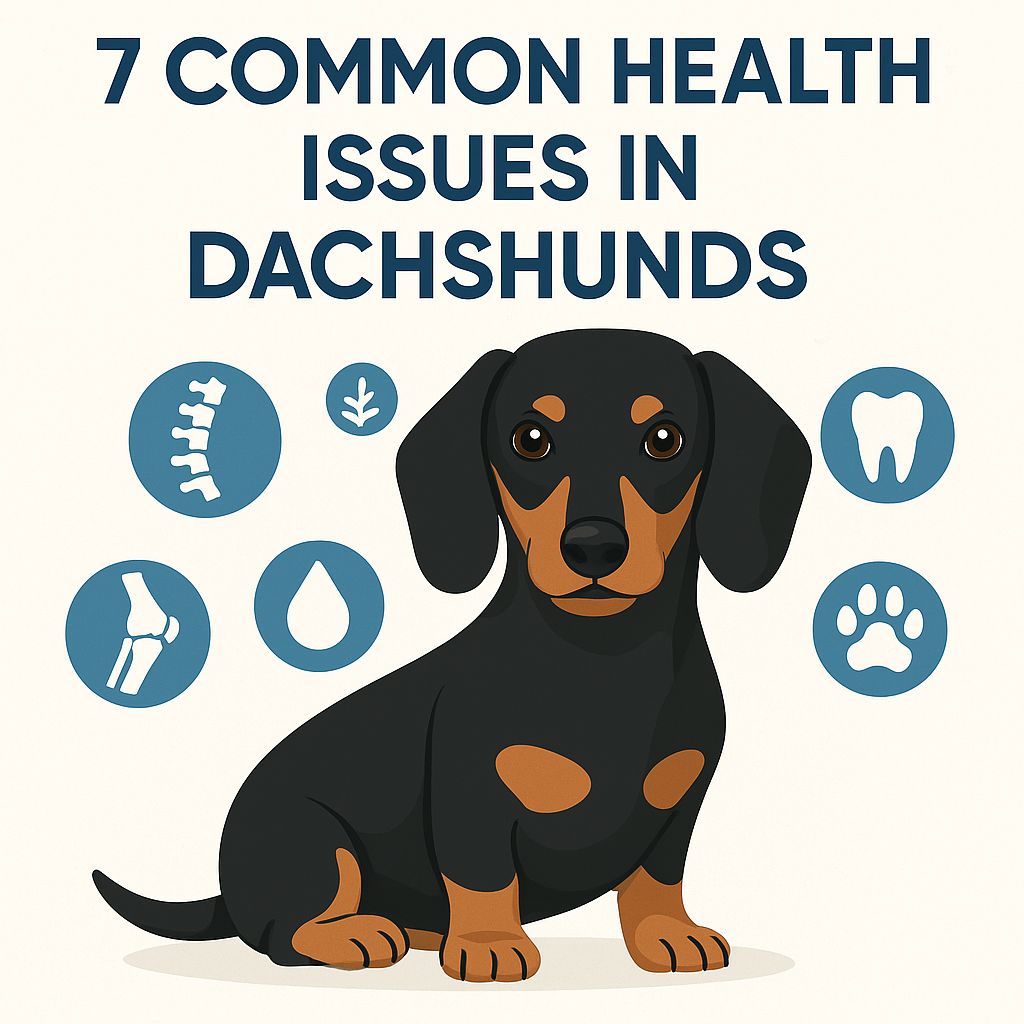
🐶 7 Common Health Issues in Dachshunds – Prevention and Care Guide Dachshunds Need Special Attention for Their Unique Bodies
7 Common Health Issues in Dachshunds – Prevention and Care Guide
Dachshunds Need Special Attention for Their Unique Bodies
The Dachshund, with its long back and short legs, is a lovable and quirky breed.
However, this unique body shape makes them especially prone to several health problems.
Understanding the common health issues in Dachshunds is crucial to ensure a long, pain-free life for your pup.
Below are the 7 most important Dachshund health concerns, along with prevention and treatment tips.
⚠️ 7 Common Health Issues in Dachshunds
1. Intervertebral Disc Disease (IVDD)
Back problems are the #1 health concern in Dachshunds. Their long spine is highly vulnerable to disc rupture or herniation.
-
Symptoms: limping, dragging legs, yelping in pain
-
Prevention: avoid jumping, stairs, or rough play; use ramps and orthopedic mats
-
Treatment: crate rest, anti-inflammatory meds, or surgery in serious cases
2. Obesity
Due to their short legs and long backs, excess weight quickly leads to disc and joint issues.
-
Prevention: controlled diet, portion monitoring, limit treats
-
Management: weight-control kibble, daily walks, routine weigh-ins
3. Patellar Luxation
Kneecap dislocation is common in small dogs like Dachshunds, leading to limping or skipping steps.
-
Prevention: maintain healthy weight, install anti-slip flooring
-
Treatment: physical therapy or surgical correction
4. Dental Disease
Their small mouths often lead to crowded teeth, tartar buildup, and gum infections.
-
Prevention: brush daily, use dental sprays and chews
-
Treatment: professional cleanings and extractions as needed
5. Diabetes
Middle-aged Dachshunds can develop diabetes due to obesity or poor dietary habits.
-
Symptoms: increased thirst and urination, weight loss, fatigue
-
Prevention: feed high-quality, low-glycemic diets
-
Treatment: insulin injections and special diabetic dog food
6. Hypothyroidism
A common hormonal imbalance in Dachshunds that slows metabolism and affects behavior and coat.
-
Symptoms: lethargy, hair loss, weight gain, mood changes
-
Diagnosis: blood tests
-
Treatment: daily thyroid hormone supplements
7. Allergic Dermatitis
Dachshunds are prone to skin reactions from food, dust, or environmental allergens.
-
Symptoms: itching, red skin, excessive licking, dandruff
-
Prevention: hypoallergenic diets, regular baths with gentle shampoos
-
Treatment: antihistamines, steroid creams, and eliminating triggers
🛡️ Daily Care Tips for Dachshund Health
-
Use ramps instead of stairs, and keep them off couches or beds
-
Feed low-fat, joint-supporting diets
-
Maintain a healthy weight at all times
-
Brush teeth daily and clean ears regularly
-
Schedule annual bloodwork and spine exams
🛒 Recommended Products for Dachshunds
-
Spine-support cushions and pet ramps
-
Joint supplements and anti-slip flooring
-
Dental sprays and enzymatic chews
-
Hypoallergenic shampoos and moisturizers
👉 Shop Dachshunds Health Products
External Resource (DoFollow)
Reference: American Kennel Club – Dachshund Health
Internal Resource
👉 Related article: Common Health Issues in Chihuahuas – Prevention Guide
🧩 Frequently Asked Questions (FAQ)
Q1. What should I do if my Dachshund suddenly loses use of its back legs?
A1. This could be IVDD. Avoid moving the dog and take it to the vet immediately.
Q2. Which common health issue in Dachshunds is the most serious?
A2. IVDD (disc disease) is the most dangerous. Prevention is the key to avoiding paralysis and chronic pain.
Q3. How do I know if my Dachshund has patellar luxation?
A3. Skipping while walking or holding up one leg briefly may indicate a dislocated kneecap.
🥦 Best Foods for Dachshunds with Joint Problems
Because of their long backs and short legs, Dachshunds are genetically prone to joint and spinal issues like IVDD and patellar luxation.
Supporting their joints through proper nutrition is just as important as physical care.
Here are some joint-friendly foods and nutrients that are especially beneficial for Dachshunds:
🦴 1. Foods Rich in Omega-3 Fatty Acids
Omega-3s reduce inflammation and support cartilage health.
-
Recommended foods: salmon, sardines, anchovies (in moderation)
-
Alternative: fish oil supplements or flaxseed oil
🍗 2. Lean Proteins for Muscle Support
Strong muscles help reduce pressure on joints and protect the spine.
-
Recommended foods: chicken breast, turkey, egg whites
-
Caution: avoid fatty meats that contribute to weight gain
🥕 3. Antioxidant-Rich Vegetables
Vitamins A, C, and E can help prevent oxidative damage in joints.
-
Recommended vegetables: spinach, carrots, sweet potatoes, kale
-
Tip: lightly steam for easier digestion
🥣 4. Bone Broth
Bone broth is rich in collagen and glucosamine, which promote joint and cartilage regeneration.
-
Serving idea: Add to dry kibble or serve as a warm treat
💊 5. Joint-Support Supplements
If your vet approves, consider adding:
-
Glucosamine & Chondroitin: promotes cartilage repair
-
Green-lipped Mussel Powder: natural anti-inflammatory
-
MSM (Methylsulfonylmethane): reduces joint stiffness
⚠️ Feeding Tips for Joint-Health in Dachshunds
-
Avoid overfeeding: excess weight worsens joint conditions
-
Feed measured portions 2–3 times per day
-
Incorporate anti-inflammatory ingredients like turmeric or blueberries (vet-approved amounts only)
-
Use slow feeders to control pace and digestion

